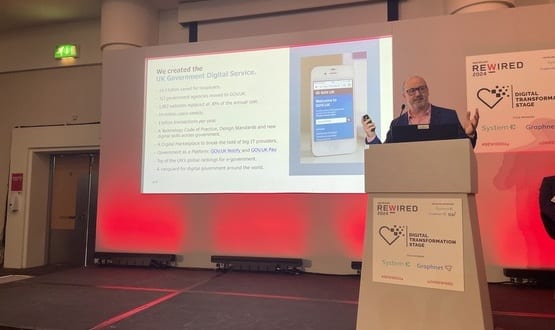The UK could be a global leader in digital health service provision if it embraced public-interest technology and stopped depending on big IT, Mike Bracken told digital leaders at Rewired 2024 this week.
“We are brilliant at R&D and terrible at scaling. We don’t do the hard work – we continue to hope for silver bullets,” he said during the closing keynote session on the Digital Transformation Stage.
Bracken, a founding partner of digital change consultancy Public Digital, was the UK’s first government chief data officer and is a world authority on digital government.
He called for “bold moves” to remove the barriers to transformation, including:
- Discard legacy IT
- Change procurement
- Mandate sharing
- Power to users, not consultants and pathways.
He also stressed that the costs of failure were too often hidden from view: “System reform demands that you know the cost of waste.” Another essential condition, he said in the Q&A session, is having “a small number of people able to say ‘no’” to proposed initiatives.
Bracken pointed out that the public-interest technology approach at the Government Digital Service, which he helped to found in 2011, had saved £4.1 billion for taxpayers over four years. More than 300 government agencies moved to GOV.UK, with 1,882 websites replaced at 30% of the cost, and a digital marketplace created to break the hold of big IT providers.
“It was necessary to stop the dependency on Big IT- it just doesn’t work. Ask a sub-postmaster,” he said, referring to the flawed Horizon system which saw hundreds of Post Office workers unjustly accused of theft.
Asked about the prospects for progress, Bracken told Digital Health News: “I’m very hopeful for Labour. They are asking the right questions.”
NHS Providers CEO Sir Julian Hartley told the Rewired audience he expected the NHS to be a “battlefield” in the coming general election. He stressed that any incoming government will face a challenging landscape, with the health service in the most difficult financial position he can remember.
“It’s worrying that six out of 10 trust leaders [in NHS Providers’ annual State of the Provider Sector survey] don’t think the NHS is taking advantage of what digital has to offer. The key to [improving] that is funding.” Currently, organisations were “scrabbling around to find capital for infrastructure”.
However, he also emphasised “positive” signs of increased collaboration and data sharing across trusts and integrated care systems.
NHS England director of digital prevention services Rachel Hope said leaders needed to be more collaborative and called for “networked conversations”: “We need all of our leaders to look at what digital can enable.”
Hope said the extra £3.4 billion in the spring Budget could support work to make the NHS “one of the most digitally enabled, productive healthcare systems in the world”.
But she admitted that teams were finding it “increasingly hard” to deliver. “We probably need a refresh around our vision. It has to be beyond digital and be part of a wider vision of transformation for the NHS.”
“We need funding for services and people, not just digital,” she added.

